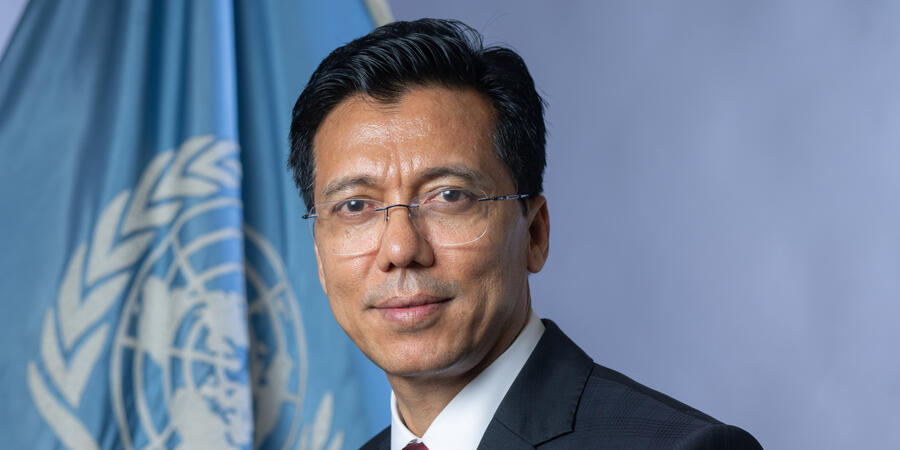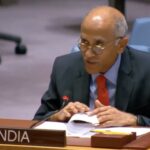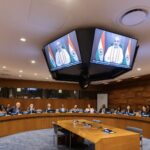Nepal’s Permanent Representative to the United Nations, Ambassador Lok Bahadur Thapa, has been elected President of the United Nations Economic and Social Council (ECOSOC) for its 2026 session, which runs from July 31, 2025, to July 31, 2026. This is the first time Nepal assuming the Presidency of this principal UN body responsible for sustainable development, international cooperation, and global economic and social issues.
Delivering his inaugural remarks before the Council on July 31, at the UN Headquarters, Ambassador Thapa described the moment as a “historic moment” for Nepal and a testament to its enduring “commitment to multilateralism.”
He added that Nepal aspires to “contribute meaningfully to build trust, strengthen multilateral cooperation, and achieve a more just, inclusive, equitable, and resilient world.”
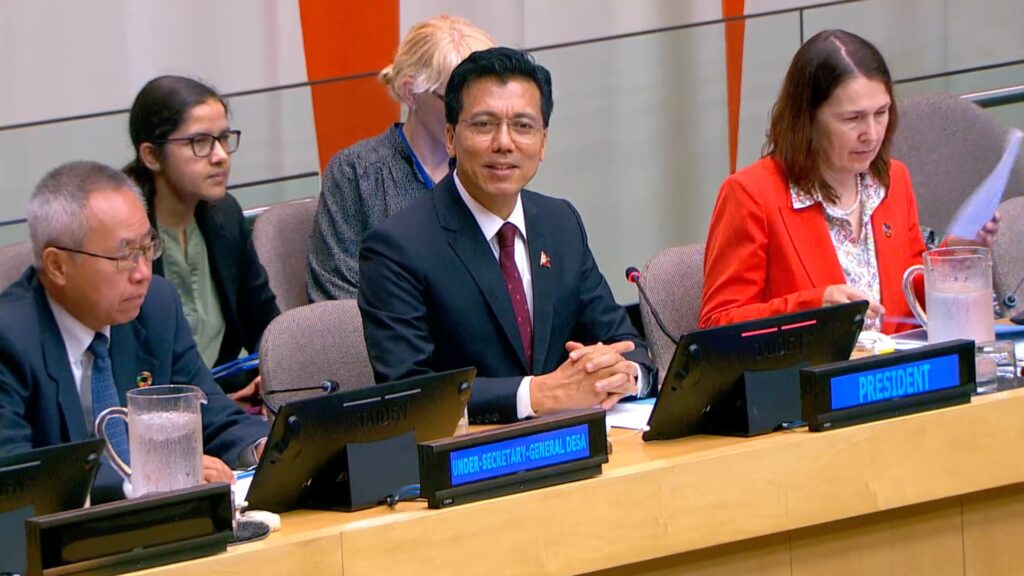
“I accept this responsibility with humility, resolve, and deep commitment to advancing ECOSOC’s vital role in shaping inclusive, coordinated, and results-driven solutions to the world’s most pressing development and humanitarian challenges,” he said.
Marking 70 years of Nepal’s membership in the UN, Ambassador Thapa noted the nation’s transformation “from a newly admitted member to a steadfast advocate of peace, security, development, and human rights.”
This year also marks the 80th anniversary of ECOSOC and aligns with the UN80 Initiative launched by the Secretary-General. Ambassador Thapa stressed that this convergence offers a timely opportunity to revitalize ECOSOC’s role through mandated reviews of the Council, the High-Level Political Forum, and subsidiary bodies, aimed at enhancing coherence, streamlining mandates, and reducing institutional fragmentation.
“This will complement the UN Secretary-General’s UN80 Initiative,” he said.
Ambassador Thapa called for ECOSOC to evolve beyond being merely a platform for dialogue and instead become a “catalyst for delivery.” He emphasized that it must reaffirm its central role in shaping a development agenda that “leaves no one behind and builds a better future for all.”
Highlighting the theme of the 2025–2026 ECOSOC session, “Transformative, equitable, innovative and coordinated actions for the 2030 Agenda and its SDGs for a sustainable future for all”—he described it as a clarion call to action. The upcoming 2026 High-Level Political Forum will review key Sustainable Development Goals (SDGs), including Goals 6 (clean water and sanitation), 7 (affordable and clean energy), 9 (industry, innovation, and infrastructure), 11 (sustainable cities), and 17 (partnerships for the goals).
Under this overarching theme, Nepal’s presidency will be guided by the motto: “Delivering Better.”
“Delivering better is not an option—it is an imperative,” he said. “It is our pathway to restoring trust in multilateralism, bridging divides, empowering the most vulnerable, and translating commitments into action. It is how we make the SDGs real—for every person, in every place.”
Ambassador Thapa elaborated that “Delivering Better” will mean reinforcing multilateralism, accelerating the implementation of the 2030 Agenda, enhancing coherence within the UN System, building partnerships, and ensuring robust follow-up and accountability.
He outlined five strategic priorities for Nepal’s ECOSOC presidency:
- Transforming agriculture and food systems to ensure food security and rural resilience.
- Championing digital inclusion and youth entrepreneurship to boost SDG progress.
- Advancing climate action and resilience, with a focus on mitigating glacial lake outburst floods (GLOFs) and protecting vulnerable communities.
- Mobilizing financing for development through systemic reforms and strategic partnerships.
- Commemorating ECOSOC’s 80th anniversary to reflect on its legacy and reaffirm its central role in inclusive and resilient multilateralism.
In addition to these focus areas, Ambassador Thapa announced Nepal’s intent to highlight enablers of inclusive and sustainable development, including investment in green infrastructure and tourism to spur growth, job creation, and regional integration. Strengthening trade capacity in developing nations and creating a favorable investment climate will also be prioritized.
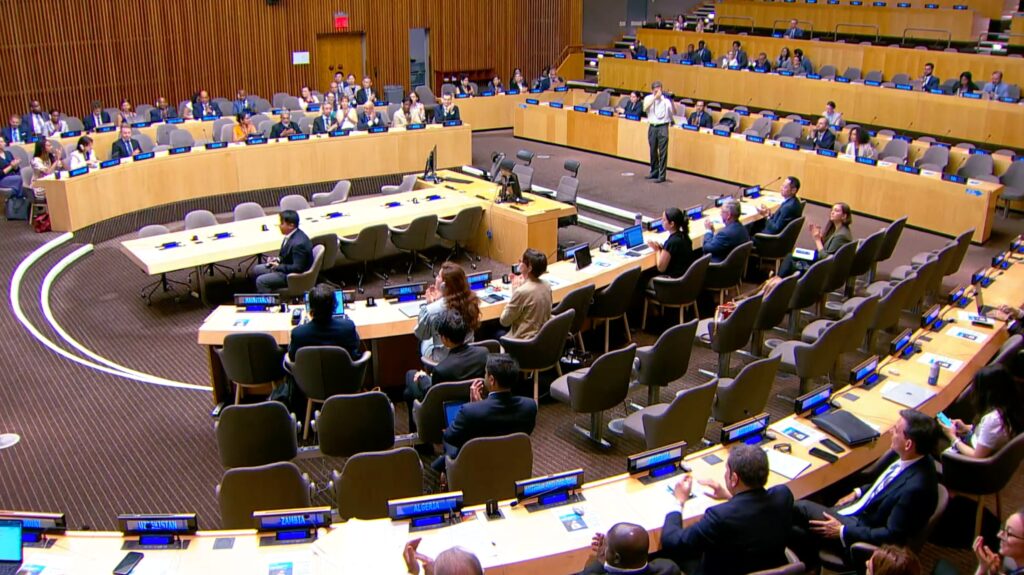
“We will prioritize efforts to strengthen trade capacity in developing countries and foster a favorable investment climate that attracts responsible capital and supports long-term development,” he said.
He further affirmed Nepal’s commitment to “global cooperation on technology transfer,” gender equality, youth engagement, civil society participation, and data-driven governance. Special attention will also be given to countries in special situations, he added.
Urging Member States to send a unified message that “multilateralism delivers—and it delivers for everyone,” Ambassador Thapa expressed, “We must empower ECOSOC to serve as an example of how multilateralism works best and delivers for people and planet… We must act with greater harmony, deeper solidarity, and renewed global cooperation.”
He also offered a sobering reflection on the complex challenges facing the global community today. “The world today is navigating a polycrisis—conflict, climate disruption, economic uncertainty, and deepening inequalities,” he cautioned, adding that the 2030 Agenda is “seriously off-track,” with only 17 per cent of SDG targets currently progressing. Nearly 300 million people are in urgent need of humanitarian assistance, and developing countries face an estimated $4 trillion annual financing gap, according to him.
In his remarks, Ambassador Thapa commended the outgoing ECOSOC President, Canada’s Ambassador Bob Rae, for his “visionary leadership and principled diplomacy.” Ambassador Rae, he said, “led the Council with clarity, conviction, and compassion—qualities that will continue to inspire us.”
Echoing that sentiment, Ambassador Rae remarked. “We hear a lot in the UN discourse about how things are broken, how things have fallen apart, how things are unhinged,” adding “But our job is to fix, it’s to repair, it’s to mend, it’s to allow things to heal, it’s to make change happen.”
Ambassador Thapa also welcomed the newly elected ECOSOC Bureau members: Permanent Representative of Algeria, Amar Bendjama; Permanent Representative of Spain, Héctor Gómez Hernández; Permanent Representative of the Dominican Republic, Wellington Bencosme Castanos; and Permanent Representative of Armenia, Paruyr Hovhannisyan.


